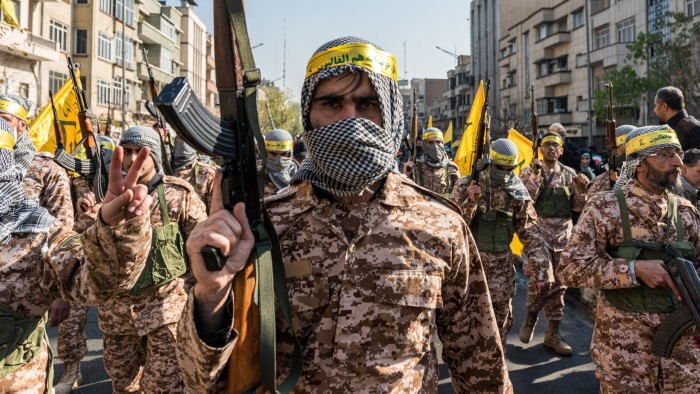Share this @internewscast.com
In a village close to Tehran, volunteers from the Basij, the paramilitary branch of the Revolutionary Guards, oversee roads and check vehicles, asserting that their efforts are to block Mossad agents from using the area as a base for aiding Israeli assaults.
These individuals are locals who, along with other Basij members, have joined the police and security forces nationwide to tackle what Iranian officials consider a comprehensive espionage network established by the Israeli intelligence agency over time.
Throughout the country, hundreds of people—predominantly Iranians and Afghans, many of whom are either unemployed or truck drivers according to state media—have been detained in the ongoing crackdown.
“You now see checkpoints run by Basij alongside the police at city entrances — something that didn’t exist before this war with Israel,” said one driver. “They usually stop SUVs, vans and trucks, searching them thoroughly for explosives or drone components.”
Since the Israeli strikes started this month, officials say spies, allegedly hired and trained long ago, have actively engaged in operations inside Iran.
Officials believe Mossad’s local network supported Israeli air strikes from the ground, providing intelligence on target locations and smuggling in drone components and explosives used to target dozens of senior commanders and nuclear scientists — operations that have underscored the depth of Israeli infiltration.
Israel also struck the Basij’s headquarters on Monday, the Israeli military said.
Support for Iran’s crackdown increased in recent days as tensions with the US escalated, culminating with American strikes on Iranian nuclear sites over the weekend.
Speaking on Saturday before the strikes, Iran’s judiciary chief Gholam-Hossein Mohseni-Ejei emphasised the need to fast-track espionage cases.
“It’s wartime . . . there should be no delay. We cannot afford to spend two or three months on one file,” he told aides in a video published by state media.

Iran executed two men on Sunday and Monday on charges of spying for Israel. One, Mohammad-Amin Mahdavi-Shayesteh, was accused of leading a cyber team linked to Mossad under the guise of an immigration consultancy, and reportedly met Mossad agents in a neighbouring country.
The other, Majid Mosayebi, was accused of transmitting confidential information about sensitive sites and high-ranking individuals to Israel in exchange for cryptocurrency payments. Authorities claimed he held regular meetings with Mossad operatives in Gulf states.
Members of the Basij have treated any activity they consider suspicious seriously.
“Two men who were taking pictures of some villas were immediately arrested by the Basij . . . and handed over to the police,” said one janitor who witnessed the incident, which took place in the village near Tehran. “The Basij also close the roads at midnight till morning and search every car that leaves or goes into the village.”
One witness in Tehran’s Grand Bazaar said police arrested “many” Afghan nationals on Monday, as they have in recent days.
The return of the 12mn-strong volunteer forces — mostly young, male regime loyalists not on the Guards’ payroll — to the streets revives a pattern reminiscent of the early years after the 1979 revolution.
Back then, the Basij conducted home and vehicle searches and seized large caches of weapons, helping establish order amid the ensuing chaos and violence.
The Islamic republic considers its experience working with local Basij forces a signature achievement, and even formed similar groups in Iraq and Syria during their civil wars.
Iran’s new Revolutionary Guards commander, Major General Mohammad Pakpour, on Sunday called the “people’s solidarity” a “blessing from God”. He said ordinary citizens had been coming to the Guards’ bases to volunteer for security support and pledged to “mobilise” them.
One regime insider called the appearance of the Basij a “good move”.
“Iran’s security forces are not going to overplay their hand by going too far or searching all cars and irritating people,” the insider said. “There is no plan to go as far as entering people’s houses to look for explosives unless we have credible reports about organised teams using residential houses.”
Iranians have mixed feelings. Many have long resented the Basij for their role suppressing anti-regime protests and civil society. Yet many have also rallied around the flag as the US and Israeli strikes stirred a renewed sense of patriotism over what they see as a threat to Iran itself, not just the government.
“This reminds me of the first years after the revolution,” said Afsaneh, a resident of Tehran. “It’s unsettling, but also somewhat reassuring to see them near my house. I could never imagine seeing Basijis and feeling happy.”
Mohseni-Ejei was briefed on the case of some detainees allegedly involved in espionage on Saturday.
According to state media, one detainee told the judiciary chief that he was jobless and filmed air defence systems to send them to Mossad contacts abroad. In another case, an Afghan national reportedly confessed he had been sending pictures and videos of sensitive centres using espionage tools, while another is said to have admitted he was paid $2,000 into a foreign bank account.
The regime insider argued Iran was vulnerable to infiltration. “In a country with long borders in the east and west and so many Iranian workers in border areas, these people were easily hired and taught a simple mechanism to assemble drones. Drones are fired from Tehran rooftops,” the insider said.
“Basij can handle this soon.”








